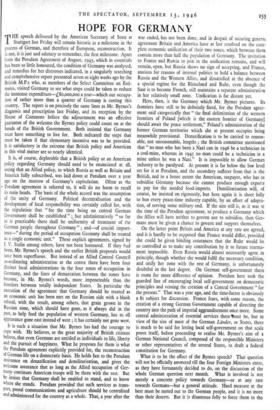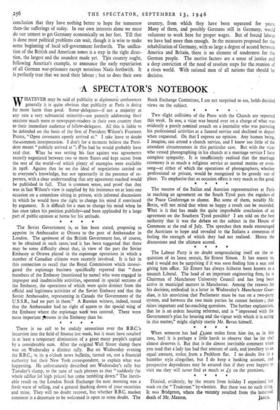HOPE FOR GERMANY
THE speech delivered by the American Secretary of State at Stuttgart last Friday will remain historic as a milestone in the process of German, and therefore of European, reconstruction. It is not, it is just and salutary to remember, the first milestone. Apart from the Potsdam Agreement of August, 1945, which in essentials has been so little honoured, the condition of Germany was analysed, and remedies for her distresses indicated, in a singularly searching and comprehensive report presented seven or eight weeks ago by the British M.P.s who, as members of the Select Committee on Esti- mates, visited Germany to see what steps could be taken to reduce the immense expenditure—£8o,000,000 a year—which our occupa- tion of rather more than a quarter of Germany is costing this country. The report is on precisely the same lines as Mr. Bymes's diagnosis and prescription last Friday, and its reception by the House of Commons before the adjournment was an effective guarantee of the welcome the Byrnes policy could count on at the hands of the British Government. Both insisted that Germany must have something to live for. Both indicated the steps that must be taken if that elementary incentive was to be provided. It is satisfactory in the extreme that British policy and American in this vital matter are so nearly identical.
It is, of course, deplorable that a British policy or an American policy regarding Germany should need to be enunciated at all, seeing that an Allied policy, to which Russia as well as Britain and America fully subscribed, was laid down at Potsdam over a year ago on the morrow of Germany's capitulation. Often as the Potsdam agreement is referred- to, it will do no harm to recall its main heads. The basis of the whole accord was the assumption of the unity of Germany. Political decentralisation and the developnient of local responsibility was certainly called for, with the stipulation that " for the time being no central German Government shall be established " ;, but adniinistratively " so far as is practicable there shall be uniformity of treatment of the German people throughout Germany" ; and—of crucial import- ance—" during the period of occupation Germany shall be treated as a single economic unit." These explicit agreements, signed by 1. V. Stalin among others, have not been honoured. If they had been, Mr. Byrnes's speech and the earlier British proposals would have been superfluous. But instead of an Allied Control Council :o-ordinating administration at the centre there have been four distinct local administrations in the four zones of occupation in Germany, and the lines of demarcation between the zones have become, in Mr. Byrnes's words, more impenetrable than the frontiers between totally independent States. In particular the execution of the agreement that Germany should be treated as an economic unit has been met on the Russian side with a blank refusal, with the result, among others, that grain grown in the Russian zone, which should have gone, as it always did in the past, to help feed the population of western Germany, has to all appearance gone east instead of west ; it has certainly not gone west.
It is such a situation that Mr. Byrnes has bad the courage to cope with. He believes, as the great majority of British citizens believe, that even Germans are entitled as individuals to life, liberty and the purSuit of happiness. What he proposes for them is what the Potsdam agreement explicitly provided for, the reconstruction of German life on a democratic basis. He holds fast to, the Potsdam insistence on denazification and demilitarisation, and gives the welcome assurance that as long as the Allied occupation of Ger- many continues American troops will be there with the rest. But he insists that Germany shall be enabled to stand, and to know where she stands. Potsdam provided that such services as trans- port, postal communications and agriculture shOuld be centralised and administered for the country as a whole. That, a year after the war ended, has not been done, and in despair of securing general agreement Britain and America have at last resolved on the com- plete economic unification of their two zones, which between them contain more than half the population of Germany. The invitation to France and Russia to join in the unification remains, and will remain, open, but Russia shows no sign of accepting, and France, anxious for reasons of internal politics to hold a balance between Russia and the Western Allies, and dissatisfied at the absence of a special regime for the Rhineland and Ruhr, even though the Saar is to become French, still maintains a separate administration in her relatively small zone. Unification is far distant yet.
Here, then, is the Germany which Mr. Byrnes pictures. Its frontiers have still to be definitely fixed, for the Potsdam agree- ment said categorically that " the final delimitation of the western frontiers of Poland [which is the eastern frontier of Germany] should await the peace settlement," Poland's administration of the former German territories which she at present occupies being meanwhile provisional. Denazification is to be carried to reason- able, not unreasonable, lengths ; the British committee mentioned that " no man who has been a Nazi can in 1946 be a technician in a coal-mine, whereas in 1945 no man could be a technician in a mine unless he was a Nazi." It is impossible to allow German industry to be paralysed. At present it is far below the low level set for it at Potsdam, and the secondary sufferer from that is the British, and to a lesser extent the American, taxpayer, who has to subsidise Germany because she cannot produce enough exports to pay for the needed food-imports. Demilitarisation will, of course, be insisted on rigorously, but here again it is sheer folly to ban every peace-time industry capable, by an effort of adapta- tion, of serving some military end. If the aim still is, as it was at the time of the Potsdam agreement, to produce a Germany which the Allies will have neither to govern nor to subsidise, then Ger- mans must be given a chance to govern and support themselves.
On the latter point Britain and America at any rate are agreed, and it is hardly to be supposed that France would differ, provided she could be given bihding assurances that the Ruhr would be so controlled as to make any contribution by it to future rearma- ment impossible. Even Russia would almost necessarily agree in principle, though whether she would fulfil the necessary condition, and unify her zone with the rest of Germany, is unfortunately doubtful in the last degree. On German self-government there is room for more difference of opinion. Potsdam here took the guarded line of encouraging local self-government on democratic principles and vetoing the creation of a .Central Government " for the present." That was a year ago, and the time-factor is obviously a fit subject for discussion. France fears, with some reason, the creation of a strong German Government capable of directing the country into the path of imperial aggrandisement once more. Some central administration of essential services there trust be, but in view of the size of most of the German Lander, or States, there is much to be said for letting local self-government on that scale prove itself, before proceeding to realise Mr. Byrnes's aim of a German National Council, composed of the responsible Ministers or other representatives of the several States, to draft a federal constitution for Germany.
What is to be the effect of the Byrnes speech? That question will not be officially answered till the four Foreign Ministers enter, as they have fortunately decided to do, on the discussion of the whole German question next month. What is involved is not merely a concrete policy towards Germany—or at any rate towards Germans—but a general attitude. Hard measure at the best must be meted out to the German people, and it is no more than their deserts. But it is disastrous folly to force them to the conclusion that they have nothing better to hope for tomorrow than. the sufferings of today. In our own interests alone we must do our utmost to get Germany economically on her feet. Till that is done most political problems cin wait, though it is wise to make some beginning of local self-government forthwith. The unifica- tion of the British and American zones is a step in the right direc- tion, the largest and the soundest made yet. Tlgs country ought, following America's example, to announce the early repatriation of all German war-prisoners except notorious Nazis forthwith. It is perfectly true that we need their labour ; but so does their own country, from which they have been separated for years. Many of them, and possibly Germans still in Germany, would volunteer to .work here for proper wages. But of forced labour we have had more than enough. In the measures proposed for the rehabilitation of Germany, with so large a degree of accord between America and Britain, there is no element of tenderness for the German people. The motive factors are a sense of justice and a deep conviction of the need of resolute steps for the reunion of a riven world. With rational men of all nations that should be decisive.



























 Previous page
Previous page